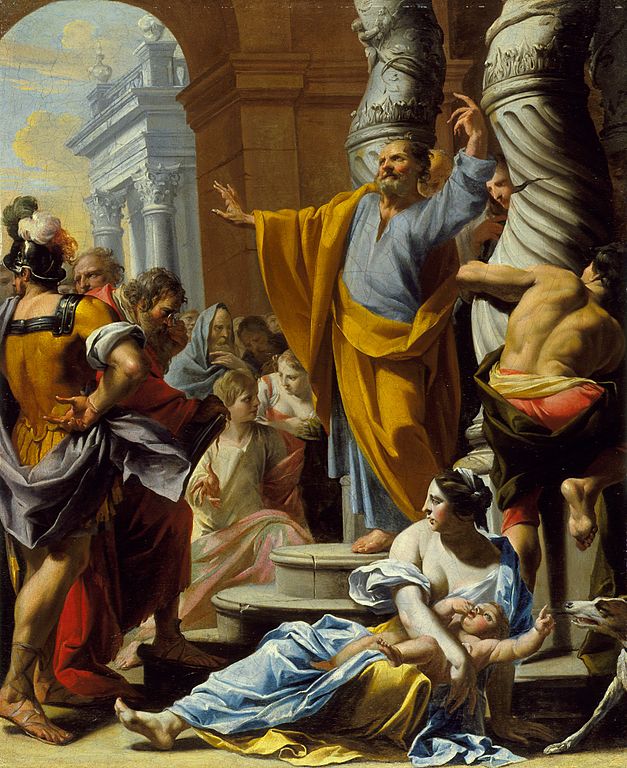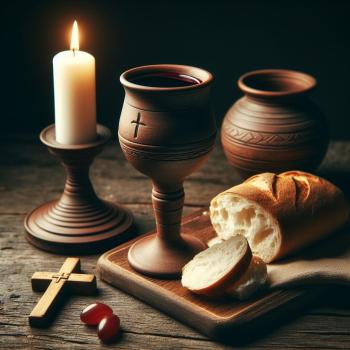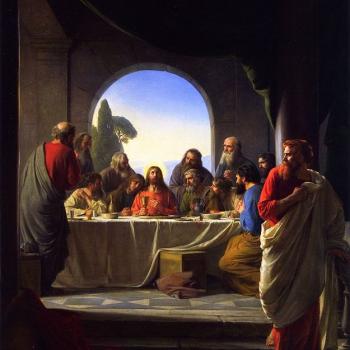
I received a letter in email from a former Catholic with Baptist-type beliefs, in response to my paper, Infant Baptism: A Fictional Dialogue. It got into some other typical Catholic-Protestant controversies as well. His words will be in blue.
*****
Thanks for taking the time to write a well-laid out letter. I’d like to respond to most of it. I provide links to many of my relevant papers.
In your fictional dialogue, you called the character Zeke, a Jesus Freak. Is that [how] Catholics refer to Born Again Christians? If Zeke is quoting Bible verses out of context as your article implies, isn’t he speaking like Satan did to Jesus in Matthew 4:1-11? Could Zeke be representing the devil in this dialogue?
No; that is my own humorous usage. I called myself a “Jesus Freak” when I was an evangelical Protestant (1977-1990) and believed much as the person I portrayed in the dialogue does. “Cathy the Catholic” was also a humorous usage.
I would say it’s a term of honor, and would be proud to be called that today as a Catholic. I’m a “Jesus fanatic.” I can’t get enough of Him! I was “born again” myself in 1977: if by that we mean a profound conversion experience and dedication of oneself totally to Christ. Catholics don’t interpret that as salvation itself.
But it doesn’t follow that we run down the commitment made and desire to be a radical disciple of Jesus. That became true in 1977 for me and remains true today, as I have devoted my life’s work to defense of Christianity and particularly Catholic Christianity, as an apologist.
Zeke represents in the dialogue very typical errors made by evangelicals (specifically Baptists and others who believe in adult “believer’s” baptism). All falsehood is of the devil. Most falsehood is believed in sincerely, as is the case, I believe, with the vast majority of Protestants.
As a former Catholic and now a Born Again Christian (since 1983) I believe it is inappropriate to baptize infants. Protestant (Christian) churches don’t baptize infants, they dedicate their newborn children unto God.
That’s not true as a blanket statement. It is true of those denominations that hold to adult baptism. Many Protestant sects baptize infants: including Lutherans, Anglicans, Methodists, and Presbyterians. Many of those also believe in baptismal regeneration, as we do, and they do so, because it is a plain biblical teaching.
We follow the example of what Mary and Joseph did with Jesus in Luke 2:22-40. They took Jesus to the Temple to be dedicated, not baptized. Then when Jesus was an adult, He gave us the ultimate example of choosing to submit and was baptized by John the Baptist in Matthew 3:17.
Baptism was not the norm in Judaism at that time. Circumcision was the rite of entrance of young male children into the covenant community. That’s why the Apostle Paul in the Bible makes extended analogies between circumcision and baptism. John Calvin later did the same, as I have noted.
John the Baptist started the new rite of baptism; hence Jesus followed suit in being baptized as an example. He was an adult because that’s how old He was when John the Baptist started his ministry. But of course, if we are talking about examples, then we have to also consider the many I gave in the New Testament, of whole households being baptized (certainly including children).
You chose to completely bypass that in your reply, but the Bible is the Bible, whether you choose to ignore inconvenient parts of it (i.e., for your theology) or not. As for me, I follow inspired revelation wherever it goes.
After the age of accountability (I’m not sure what that age is, perhaps 13), each person may and should choose Jesus as their Saviour (being born again). Then soon afterwards, choose to be baptized as an outward sign of that inward act of being saved.
I haven’t found such teaching in the Bible. It would hold for an adult convert who had never been baptized. The Bible talks about no such age. But it refers to infant baptism and regenerative baptism. Thus, you are following mere traditions of men. I am following what the Bible explicitly lays out.
*
At our first birth, we are all Gods creation, but only become his children by choice, being born again, the second birth. God only has children, no grandchildren. According to the Bible as final authority, Jesus says to Nicodemus…. “Ye must be born again” John 3:1-21 Then, as adults, being baptized (by a conscious choice) should be more then just being sprinkled. Full immersion baptism in water is most symbolic of what really happens after one is born again. Dying in Christ, being buried with Him and rising again, as a new creation. Infants don’t have the capacity to choose this. Nor should their parents choose it for them.
Jewish parents chose to circumcise their sons, who didn’t know what was going on, either. This included Jesus. According to God, that made Jewish children members of the covenant community. Likewise, with infant baptism. The Bible shows infants being baptized. That ought to settle it, but for some reason the Bible is insufficient for you.
In your article, Cathy the Catholic says to Zeke “Are you saying that a baby (not baptized) can’t be saved and will go to hell if it dies before the age of reason?” Why do you think that? No…. Christians (Protestants) don’t believe this. If a baby dies before the age of reason, it goes to Heaven. No baptism necessary.
Some extreme Protestants (including at least some Calvinists, with their double predestination) indeed believe this. Most do not. That’s why I had the Protestant reply, “No, I would never say that. God is too merciful to let that happen to an innocent little baby.” You highlight my question and ignore the answer I put in the Protestant’s mouth. Nor do Catholics believe that baptism is absolutely necessary in all cases. We also believe in baptism of desire, based on data such as the thief on the cross, whom we know was saved.
But it was a long time Roman Catholic belief (superstition) that unbaptized babies went to a place called Limbo. And what happened to the teaching of Limbo? As you should know, it was quietly dismissed around 2006. Limbo was never an official Catholic Church doctrine. It was a fictitious place, nowhere found in the Bible. But the Catholic Church just made the inference (invented) it to get Catholics an urgency to baptize their children. This was more to make the newborns members of the Catholic Church, than believers in Jesus. Or the parents may never see their child again (in Heaven) if it died prematurely, without being baptized.
You are correct that limbo was never an official, binding Catholic doctrine; only a theological speculation (as I have written about, back in 2007). Hence it could be “demoted” so to speak, as it has been (which I think was great, because I never believed in it, myself). Hades or Sheol is a state in the afterlife besides heaven or hell, that is discussed in, for example, Luke 16 (Lazarus and the rich man). That’s not far from what limbo might be like, if it actually existed.
Another place highly inferred by the Roman Church is Purgatory. Also not found anywhere in the Bible. But unlike Limbo, the existence and purpose of Purgatory is official Catholic Doctrine. But Jesus never spoke of Purgatory in any of the Gospels. Nor does it appear in the Epistles or in the Old Testament.
To the contrary, I have found its essential aspects and nature in fifty biblical passages, and I’ve also gone into depth about several individual ones, and what Church fathers thought about them.
It was the abuse of indulgences (related to shortening one’s stay in Purgatory) that caused the former Augustine Monk Martin Luther to “protest” in 1517. Purgatory, along with some 94 other Catholic teachings not justified in the Bible is what his 95 Thesis was about.
Indulgences was only one issue, and Luther distorted it. By no means were all of the 95 theses inconsistent with Catholicism. It’s far more complex than that, as apologist Jimmy Akin noted. Luther was still a Catholic and would be for almost four years after he wrote that. Luther was excommunicated because he had departed from the Catholic faith in at least 50 ways before the time of the Diet of Worms in 1521.
Jesus only spoke of Heaven and Hell . . .
That’s not true. He referred to what is known as Hades / Sheol in Luke 16. RSV uses the word “Hades” in 16:23. Hades is referred to nine times in the New Testament. Sheol (Hebrew for the Greek, Hades) is mentioned 63 times in the Old Testament. “Hell” doesn’t even appear in the Old Testament in the RSV.
and belief in the Father through the Son Jesus as the only way of salvation.
*
We are. We have to accept it and appropriate this salvation in our life. Hence, when the Bible refers to the last judgment, 50 times it mentions our works, and never faith alone. Pretty odd and striking, huh? Once again, Catholics are thoroughly biblical and Protestants cannot explain why this described state of affairs regarding judgment would be.Purgatory is another exclusive Catholic invention: another fictitious place, worthy of more fictional dialogue. Perhaps [there will be] another article from you [about that] in the future.
I do have a fictional dialogue on purgatory, posted on my blog! And I have tons of arguments about it on one of my web pages. It’s far more biblical than the two Protestant pillars of Scripture Alone (I’ve written two books about that, and another coming soon: one / two) and Faith Alone: which have no Scripture at all to back themselves up. The only time the phrase “faith alone” appears in Scripture, it is expressly denied:
James 2:24 (RSV) You see that a man is justified by works and not by faith alone.













